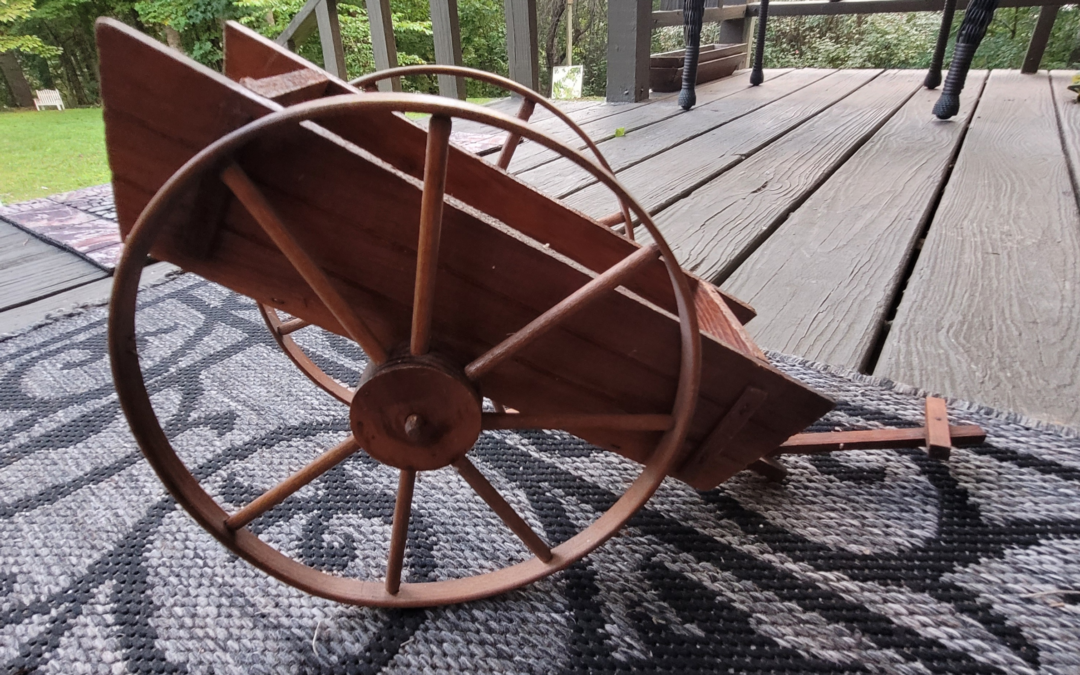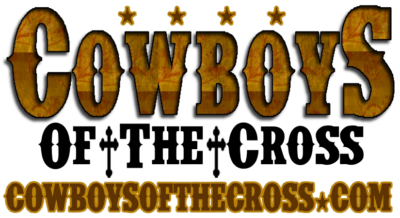
by admin | Sep 9, 2021 | Behind the Bucking Chutes
By Scott Hilgendorff / Cowboys of the Cross
It can become hard to serve others when your services makes them feel like they have to return the favor. The best advice I ever received about being able to serve others in our culture is to actually ask them to serve you first.
It sounds like it goes against what the Bible teaches but here’s what happens: if I’m the new guy in the neighborhood and I try to do something for my neighbors as a way to serve them and get to know them, we unintentionally put them in the position of needing to return the favor; they owe us.
Buuuuut, if you ask THEM to help YOU first, you are now in the position of owing them a favor and unless they are just horribly unfriendly people, most are going to be willing to help you when you ask. You still get to know them, a relationship with the neighbor can start and it will be easier to serve them when opportunities arise.
My friends that explained this to me had this happen with a new family that moved in the neighborhood. I don’t remember the details but they had an opportunity to just jump in and help the family with something fairly significant but after that, found the couple was avoiding them. It wasn’t until my friends tried asking them for help that they all then started talking freely across the street and my friends realized they were being avoided because the couple felt they were in debt for the help and felt awkward.
I’m still the new person on the mountain and have a handful of neighbors where I live near Gatlinburg. One of the couples are descendants of the original family that settled the mountain and eventually sold portions of it that have become a handful of homes and rental cabins that make up our little mountain neighborhood.
When I first got up there, I did a terrible job of meeting more than the closest neighbor who sits a bit behind and above me on the ridge we share.
For awhile, we were mostly just “hey neighbors” or “wave as you go by neighbors” so for the ones I waved “hey” to the most, I decided to bake some cookies as we got close to Christmas two years ago. It’s the only time I do something like that, making shortbread like my mom had made when I was little. I had put plates of them in three neighbor’s mailboxes with Christmas cards and a note with my contact information to sort of introduce myself.
One never said anything, another put a bunch of candy canes back in mine and another didn’t find theirs until a bear had knocked the mail box over that next summer because I put them in a long-since gone relative’s box by mistake. I got a panicked voicemail from the neighbor feeling terrible that they had never acknowledged the gift, not even knowing what it was that the bear had eaten. She apologized repeatedly when I called her back because she felt terrible and I ended up feeling terrible because it had made her feel like she was in an awkward spot.
So I tried the advice I had overlooked the first time around by dropping off cookies. With the neighbor closest to me I had an extended road trip that was taking me away for more than a few weeks and I was able to meet him by actually going over to ask him if I could get him to cut my lawn once while I was away. I offered to pay but he refused.
Perfect. I now owed him.
We have visited multiple times now since then and I’ve been able to help him pile wood with no sense of obligation anymore. We now are both comfortable asking for help if we need it.
But there was still that problem with the original mountain family. That wonderful old-timey culture is deeply rooted. The phone call about the Christmas card found months later at least opened the door for me to drop in the next time I saw them outside. Caught unprepared, the wife excused herself, went inside and came out with a jar of apple butter she had made back in the fall. I had created this need for her to give back. So after a trip home to visit family in Ontario, I came the next time with a box of cookies you can only get in Canada. Because I had expressed interest in it during our conversation, I left with the moon-phase guide to planting a garden they kept on their refrigerator. Next time, having learned she couldn’t eat much sugar, I came with some chips in a style you can only get in Canada and left with a wooden wagon planter from her porch.
Finally, a couple weeks ago, I was getting ready for another trip to Ohio and Ontario when my covid test for the border crossing came back inconclusive and I was going to have to go to town again to take another test. At the same time, my lawn tractor backfired and died on me right as the husband was driving by on his own to cut the lawns on the two rental cabins down from me. I really did need some help and was able to approach him to ask if he had enough gas and time to keep cutting one more while I ran back to town for the second test.
He wouldn’t accept offer of payment and also said he’d help figure out what was wrong with the mower when I get back.
My hope is that by finding myself in real need of help, this has broken the cycle of gift-giving and opened the door to where they won’t mind asking me for help or that I can pitch in when I see a need without having to be given something off their porch.
Philippians 2:3-4 Do nothing out of selfish ambition or vain conceit. Rather, in humility value others above yourselves, 4 not looking to your own interests but each of you to the interests of the others.
The idea of asking for help instead of offering it seems contrary to scripture except it can be an effective way to build a bridge that opens the door to more easily serve those neighbors and develop a closer relationship that allows the gospel to be shared.
Rodeo and bull riding give us all a great opportunity to ask for help and I think in that environment, it’s easier for us to do it either way. If we need help, we’re going to ask for it and if we see someone who needs help, most of us are pretty good at stepping up and helping without being asked. It’s just a natural way of doing things so it doesn’t create that sense of obligation.
But what are some ways we can either serve or ask to be helped in order to build connections with others around us outside the sport? We help others so we can show Jesus to them but however we do it, we need to build connections so we can also tell them who Jesus is and what he did for them.

by admin | Sep 9, 2021 | Strengthening Your Grip
By Jesse Horton / Cowboys of the Cross
We continue to consider how God communicates with us this week. We already know that God speaks to us primarily through the Scriptures. He also speaks to us through prayer, which includes us doing more listening and less talking. Today, I’d like to consider how God speaks to us through other people.
Rodeo cowboys and bull riders know what it means to give and seek advice. They do it all week long when it comes to decisions about what events to enter to how to set their saddle, how much reign to give or for a barrel racer, how to handle to ground at a particular venue. But even the smallest decisions shouldn’t be made without taking into account our need to hear God.
As a general rule, it’s always wise to seek the advice of trusted counselors before making any decisions that have potentially important alternative outcomes. Proverbs 12:15 tells us, “The way of a fool is right in his own eyes, but a wise man listens to advice.” None of us has perfect or complete insight into any matter. We all have our own blind spots. That’s why we need to consider the wise and varied perspectives of others. To assume we have it all under control and forego the discussion of important decisions and the various possible outcomes is nothing short of foolishness. On the other hand, we need to be cautious when someone comes to us claiming to have a word from God for us that is not confirmed by Scripture, our prayer time, and the witness of the Holy Spirit. Not all the voices we hear are the voice of God!
Nevertheless, we need the advice of others, and we may need lots of it. In fact, there is great wisdom in seeking advice from several different people prior to making an important decision. Proverbs 15:22 says, “Without counsel plans fail, but with many advisers they succeed.” Our understanding is never perfect – not of the world around us, the circumstances we live in, nor of ourselves. The experiences and perspectives of many varied counselors can be important in increasing our understanding and leading us to make a better-informed decision.
In addition to seeking God’s will for us through prayer and fasting, it is often necessary to discuss our plans with multiple other people who may be involved and affected by the decisions we make. We do not exist in vacuums, isolated from contact and interaction with the world. Proverbs 11:14 reads, “Where there is no guidance, a people falls, but in an abundance of counselors there is safety.” The people we live with, work with, and serve with each day may need to be considered before we drop a bombshell on them and expect them to deal with the fallout. They may buck at the thought of being forced on a path of our determination or be able to offer other attractive alternatives.
So, whom should we seek to provide wise advice? First, mature followers of Christ will always be a wise place to seek advice for a biblical viewpoint. Additionally, people who have more life-experience than us will almost certainly provide perspectives from both their successes and their failures irrespective of their faith convictions. Likewise, anyone who knows us on a deep and personal level can help us search our hearts and motives, even if they don’t align with our religious beliefs.
It is critical that we not be unwilling to accept advice from others. Equally important, however, is that we do not insist upon someone else making our decisions for us. Often, fear and anxiety can become crippling and leave us stagnating with indecisiveness. While it is important that we seek the advice of others, it is also important that we come to a decision in a timely manner. Just as it is detrimental to go off half-cocked and make a rash decision, it is also to our harm – and maybe those with whom we interact – to sit paralyzed on the sidelines while the world keeps turning.
My advice is that when you have a big decision to make, come up with a reasonable deadline by which you’d like to have your decision made. Then determine 1) who will be directly affected and needs to be “in-the-know,” 2) who knows you well enough to be able to anticipate your decision, and 3) who might have some relevant life-experience to offer. Most importantly though, you need to seek the counsel of mature brothers and sisters in Christ who love you enough to tell you even the most difficult of truths with an eye on giving God glory in all things.

by admin | Aug 26, 2021 | Behind the Bucking Chutes
By Scott Hilgendorff / Cowboys of the Cross
1 Peter 3:8 Finally, all of you must live in harmony, be sympathetic, love as brothers, and be compassionate and humble. 9 do not repay evil with evil…
Reasons to be angry seem to be coming at us from every direction. As believers, we are instructed to live very differently from the would around us.
To live in harmony is the opposite of what a lot of us see in social media where we share our anger and add fuel to the flames of disunity instead of inviting someone to sit down and warm themselves by our campfire.
To be sympathetic would be to try to understand another person’s hurt and anger no matter how much we disagree with their reasons to feeling that way.
Loving as brothers is in action. Just like we would loan our rival in sudden need a bull rope or even a horse to mount, we are tasked to do good toward others who might even hate us.
To be compassionate and humble is to reach out help others who are nothing like us.
To be or carry out all of those actions and attitudes in the list isn’t just as simple as those illustrations but it gives us a place to start as we work to understand as Christians, we’re called to be different from the unbelieving world.
But wait, it gets even harder.
The second half of this chapter touches on being different from the world around us but it focuses on how being different can lead to suffering.
Jesus suffered on the cross on our behalf, taking the punishment meant for our sin. He did this so that by believing he was the son of God and did this for us, that if we would repent of our sin and ask to be forgiven, we could be saved from God’s wrath and instead have a perfect eternity in Heaven.
1 Peter 3:13-14 Who is going to harm you if you are eager to do good? 14 But even if you should suffer for what is right, you are blessed. “Do not fear their threats; do not be frightened.”
Because of what Jesus did for us, we should have a desire to do good. We may be all out feuding with someone at the rodeo but when we help them change out the flat tire on their stock trailer, they might have been the one that did it at the rodeo last weekend but this time, they aren’t likely to turn around and slash the tires on our truck. But take this as far as it can go, there are missionaries preaching the gospel in other countries who have been tortured and killed for preaching from the Bible. One of the worst things that could happen to us in North America so far could be a situation where a rodeo announcer loses a gig because the producer doesn’t want him doing an opening prayer or praying in Jesus’s name. Meanwhile there are Christians in Afghanistan facing an uncertain future in a culture that was already dangerous to begin with.
It’s hard for us to get our heads around it but the reality is, those who have lost their lives for their faith have gone on to their perfect life in Heaven while we’re still here in the sinful and broken world. Those who have suffered in other ways have Heaven to look forward to.
So what’s holding you back? Do good.

by admin | Aug 12, 2021 | Strengthening Your Grip
By Jesse Horton / Cowboys of the Cross
We’ve recently been studying how communication between God and man happens. We all want to hear from God and know his will for our lives, but we’re unsure how that happens or even if it happens. I want you to be certain of this: God wants you to know him! He wants a relationship with you, and all relationships require time and communication.
The primary way God communicates to us is through the Scriptures. Spend time studying what God has said about himself, about humanity, and about his mission of reconciliation. Study deeply and intentionally. The second way God communicates with us is through prayer. We have recently been studying the model prayer (the Lord’s prayer) and have come to the point where we make petitions; that is, we ask God for specific things. But what should ask for?
“Give us this day our daily bread.” The book of Joshua records the conquest of the promised land by the nation of Israel as they moved from slavery in Egypt to a land known for its abundant resources. Such a drastic change in station certainly requires spiritual preparation, and that is precisely what we see in the 40 years they spent wandering in the wilderness prior to the conquest of the land of Canaan. Take a moment right now and read Deuteronomy 8:2-11 to see what God reminded his people of as they were completing their spiritual preparation for the land that flows with milk and honey. God wanted to remind his people that they are not independent or self-sufficient. No! Yahweh was their provider, protector, and conqueror; Israel had been completely dependent upon the goodness of God to survive those 40 years, and just because they were now entering a land of plenty did not mean they could forget their dependence or his provision. God is the one who provided the promised land. Each and every day, we should depend on God to provide the resources we need to live and serve him. Just as the Israelites in the wilderness, we can find God faithful to provide what we need, maybe not in abundance or excess, but certainly enough for this day.
“Forgive us our trespasses as we forgive those who have trespassed against us.” One of the greatest sins those who follow Christ commit is the sin of forgetfulness. We are quick to forget the immense mercy and grace that assures us of our salvation, so when we are wronged, we respond with anger and wrath. Read Matthew 18:23-33. This wicked servant had been forgiven a debt that was so great he couldn’t be expected to pay it back in 10 lifetimes, yet when one of his fellow servants owed him a debt he could pay back over three to five years, the wicked servant choked him and threw him in prison. We who have been forgiven such a great debt against such a holy God should be quick to forgive others who have wronged us. Pray daily to remember the forgiveness you’ve received, for no one gives grace better than the one who is truly convinced of his own need for it.
“Lead us not into temptation but deliver us from the evil one.” Praying in this manner acknowledges three important truths. First, there is One who has ultimate authority and knows what is good and right for you to do and what you should not do. Regardless of who you are in your community, your church, or this world there is One to whom you must bow. Second, the One who has ultimate authority has revealed his moral will.
There are clearly defined boundaries in which believers should live. We do not make our own determinations of good and bad, right and wrong. Third, we live in a world full of temptation where we have an enemy whose method of destroying us is to persuade us to accomplish our own demise through the pursuit of things that keep us from experiencing God’s kingdom rule.
In Numbers 22-24, Balak king of Moab was fearful of the Israelites who were conquering kingdoms on their way toward him. He contracted a pagan priest named Balaam to curse Israel so that he might defeat them. However, God prevented Balaam’s cursing; no outside force was great enough to withstand Israel as they followed God’s command (You should read these chapters; a talking donkey is worth the time!). But in the 25th chapter, it is reported that the Israelite men pursued sexual relationships with Moabite women who led them into idolatry. This compromise of morality that led to idolatry caused a plague that claimed 24,000 Israelite lives. Though they could not be destroyed by the curses of their foes, they might quickly be overcome when they compromised their loyalty to God and his commands. God’s boundaries and requirements for our lives are for our own good and the good of our faith community!
Take note of Numbers 25:7-8; the plague was stopped when Phinehas took decisive action against the idolators by killing one of them and his Moabite mistress. You tell me: is it important that we hold the members of our faith community to moral standards, or should we compromise to avoid hurting someone’s feelings?
There are three things Jesus asked for in this model prayer. First, he asked for daily provision. God knows our needs and is willing and able to provide if we simply recognize our dependence on him. It might actually be a win at the rodeo because the finances or the confidence it gives is what we really need that week. It might be the struggle of a continued losing streak because how we grow from it is what we really need. Second, he asked that we would be forgiven as we are forgiving. Sin is a part of our experience in this life and recognizing our own need for grace will result in the extension of grace to others when they sin against us. It is by grace that we have peace with God, and it is by grace that we will have peace with others. Third, we live in a world of things that can tempt us to wander from the path God has set before us. The problem is not so much the things outside of us as it is the desire for sin inside of us. James 4:1 and following reminds us of this truth: “What causes quarrels and what causes fights among you? Is it not this, that your passions are at war within you?”
As you pray, ask God to provide for you needs today. Ask him to forgive you of your sin and from that grace empower you to be forgiving toward others. Finally, ask him to keep you from the things your sinful heart is drawn toward and from the tactful lies of the enemy of your soul.

by admin | Aug 12, 2021 | Behind the Bucking Chutes
By Scott Hilgendorff / Cowboys of the Cross
Do we believe in God or karma? It can’t be both. If God is real, there is no karma.
When someone finally gets what we think they deserve, so many of us call it karma. The stock contractor that did you dirty in a deal loses his best bull in an accident down the intestate. Your barrel racing rival’s horse comes up lame hours before the finals after always seeming to get the same coveted spot in the draw week after week. Your ex-girlfriend ends up spending a weekend in jail because of something she got caught up in with the guy she was cheating on you with.
Faith in God and belief in karma are two very different things. You simply cannot believe God is in control while some other force of nature is affecting outcomes at the same time.
Christians, even the ones you don’t like, actually don’t get what they deserve and those who choose not to believe and turn their back on God, actually do.
One of the core truths within what we call the gospel is the understanding that God will punish sin. All sin. Rigging the draw or beating your girlfriend. It all gets judged by God and God alone. But, through His son, Jesus Christ, He gave us all a way to be in good standing with Him, no matter what we have done. Jesus took the punishment meant for our sins so that by believing he was the son of God, died on the cross for us and rose again to be with God in Heaven, we can find a way to be saved from our sins. By believing in who Jesus was and is and what he did for us, and then by recognizing and accepting that we are sinners, genuinely repenting of that sin and asking God to forgive us, we can be saved from the punishment and assured an eternal, perfect life in Heaven.
The consequences of sin without salvation through Jesus are eternal separation from God in Hell. It’s an even playing field where we can believe in God and embrace His plan for us to be saved with an eternity in Heaven or we can believe in karma or whatever else we want to believe in, but any of the rest of it leads us to Hell.
So why does something bad finally happen to that dirty rotten so-and-so? Why do all his wrongdoings finally catch up with him? The same reason the nicest cowboy everyone knows dies in the night because the generator was pumping carbon monoxide into the camper.
Karma didn’t catch up with both of them. The consequences of living in a fallen world did.
We live in a broken world because of the choice Adam and Eve made in the very beginning. The world was perfect until they messed up and now seemingly good people can end up doing some pretty horrible things, entire towns can burn up in a wild fire and the person you’re closest to can end up with cancer.It can be hard for us to imagine a perfect eternity, especially when we’re struggling or at our lowest.
It can be hard to realize that through all the struggles and heartaches we face in between the good times, that all of this is temporary and we only have to go through it a short time.
Romans 8:28 And we know that in all things God works for the good of those who love him, who have been called according to his purpose.
We may not understand why we’re going through something that seems absolutely horrible but we can trust that while sinful harm might come to us, God will still use it for our good. I would rather trust in that than karma.
Revelation 4:11 “Worthy are you, our Lord and God, to receive glory and honor and power, for you created all things, and by your will they existed and were created.”
I’m going with God.





Recent Comments